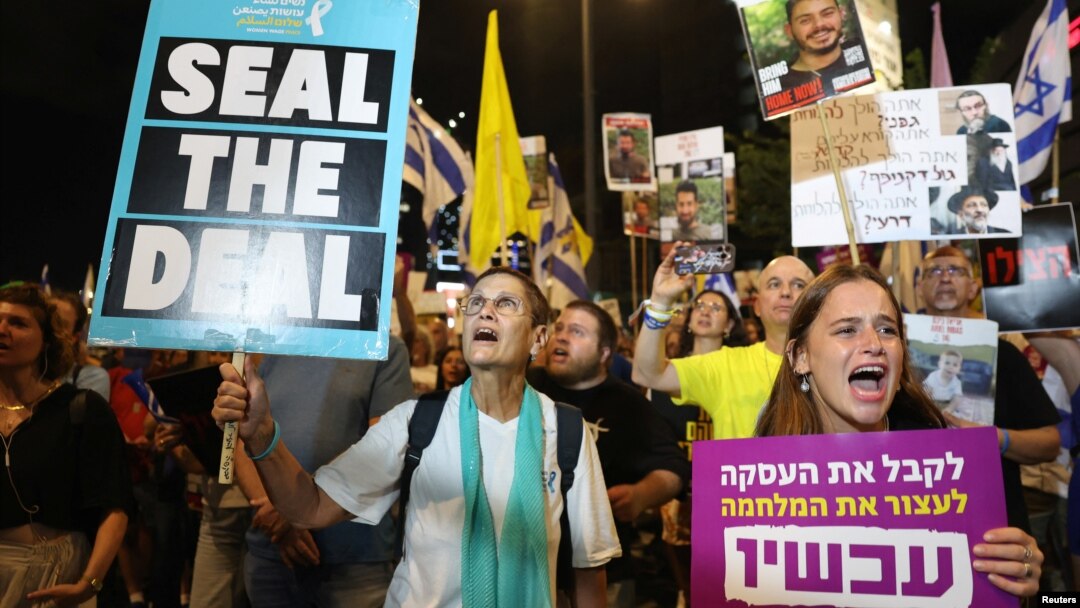The U.S. on Tuesday strongly urged Israel and Hamas to reach a cease-fire deal to halt nearly 11 months of fighting in Gaza and free the remaining hostages the militants are holding.
Your browser doesn’t support HTML5
Washington pushing for deal to end Gaza conflict
"There are dozens of hostages still remaining in Gaza, still waiting for a deal that will bring them home. It is time to finalize that deal," State Department spokesman Matthew Miller told reporters after Israeli forces found six hostages over the weekend that Hamas had shot to death in a tunnel in the southern Gaza city of Rafah.
"The people of Israel cannot afford to wait any longer. The Palestinian people, who are also suffering the terrible effects of this war, cannot afford to wait any longer. The world cannot afford to wait any longer," Miller said.
He said that the United States will work "over the coming days" with mediators Egypt and Qatar "to push for a final agreement."
One key point of contention in the negotiations has been Israeli Prime Minister Benjamin Netanyahu's insistence that Israeli troops remain at the border between Gaza and Egypt.
SEE ALSO: Netanyahu pushes back on pressure to reach cease-fire with HamasBut Miller said the U.S. is opposed “to the long-term presence” of Israeli troops in Gaza.
The State Department spokesman said that reaching a cease-fire and release of the 100 or so remaining hostages “will require both sides to show flexibility. It will require that both sides look for reasons to get to yes rather than reasons to say no."
The U.S. plea for an end to the fighting came after Israel’s military said it had killed a Hamas militant who participated in the October assault on Israel and was seen in a widely viewed video drinking soda in front of two kids who were wounded in a grenade attack that killed their father.
The Israel Defense Forces identified the militant as Ahmed Fozi Wadia and said he paraglided into the Netiv HaAsara community during the October 7 attack.
Wadia was among eight militants killed in a Saturday airstrike in Gaza City, the Israeli military said.
Netanyahu’s office said it will win its war against Hamas with or without arms from Britain, a day after the British government announced it would suspend some arms exports to Israel due to concerns about their use in Gaza.
“Instead of standing with Israel, a fellow democracy defending itself against barbarism, Britain’s misguided decision will only embolden Hamas,” Netanyahu’s office said.
SEE ALSO: Britain suspends some arms exports to Israel over risk of breaking lawBritish Foreign Secretary David Lammy said there was a “clear risk” that some of the weapons could be used to “commit or facilitate a serious violation of international humanitarian law.”
British Defense Secretary John Healey told Times Radio on Tuesday that the suspension of 30 of 350 arms export licenses to Israel “will not have a material impact on Israel’s security.”
Netanyahu is also facing pressure at home after several days of protests calling on him to agree to a cease-fire with Hamas, especially after the six hostages were found shot to death.
White House national security spokesman John Kirby told reporters, “Clearly what happened over the weekend underscores how important it is to get this [cease-fire] done as quickly as possible."
Miller at the State Department said, “There are no winners [in Gaza] in that pain for Israelis, for Palestinians, for the region, has gone on for far too long. It's time to reach a cease-fire that brings the hostages home, that alleviates the suffering of the Palestinian people, and it ultimately brings an end to this war, and that's exactly what we will continue to push to reach.”
Among the sticking points in negotiations is Netanyahu’s push for Israel to retain control of the Philadelphi Corridor on the Gaza-Egypt border. Israel claims Hamas uses tunnels along the corridor to smuggle weapons into Gaza. Egypt and Hamas deny the claims.
Netanyahu has refused to agree to a cease-fire deal calling for an Israeli military withdrawal from Gaza that would lead to a permanent halt to the fighting — for fear that Hamas could rearm itself and endanger Israel’s long-term security.
Hamas has accused Israel of dragging out negotiations by issuing new demands, including that Israel remain in control of the Philadelphi Corridor and a second corridor running across Gaza.
Hamas has held to the broad agreements of a three-phase plan put forth by the U.S. administration of President Joe Biden in July: Hamas would release all hostages in return for an end to the war, a complete withdrawal of Israeli forces and the release of dozens of Palestinian prisoners.
Biden on Monday rebuked Netanyahu for his handling of the hostage situation and cease-fire negotiations.
As he arrived Monday back at the White House after a vacation, Biden was asked whether he thought the Israeli leader was doing enough to free the 100 or so remaining hostages, a third of whom Israel believes are dead. Biden responded simply, “No.”
Hamas militants killed about 1,200 people and captured about 250 hostages during the October 7 terror attack on southern Israel. The Israeli counteroffensive has killed nearly 41,000 Palestinians in Gaza, most of them women and children, according to Gaza health officials, while the Israeli military says the death toll includes several thousand Hamas combatants.
Hamas has been designated a terror group by the U.S., the U.K. and other Western countries.
VOA’s Nike Ching contributed to this report. Some information came from The Associated Press, Reuters and Agence France-Presse.


